Here all possible ways (relatively) to search for string
// 1. includes (introduced in ES6)
var string = "string to search for substring",
substring = "sea";
string.includes(substring);
// 2. string.indexOf
var string = "string to search for substring",
substring = "sea";
string.indexOf(substring) !== -1;
// 3. RegExp: test
var string = "string to search for substring",
expr = /sea/; // no quotes here
expr.test(string);
// 4. string.match
var string = "string to search for substring",
expr = "/sea/";
string.match(expr);
//5. string.search
var string = "string to search for substring",
expr = "/sea/";
string.search(expr);
Here a src: https://koukia.ca/top-6-ways-to-search-for-a-string-in-javascript-and-performance-benchmarks-ce3e9b81ad31
Benchmarks seem to be twisted specially for es6 includes , read the comments.
In resume:
if you don't need the matches.
=> Either you need regex and so use test. Otherwise es6 includes or indexOf. Still test vs indexOf are close.
And for includes vs indexOf:
They seem to be the same : https://jsperf.com/array-indexof-vs-includes/4 (if it was different it would be wierd, they mostly perform the same except for the differences that they expose check this)
And for my own benchmark test. here it is http://jsben.ch/fFnA0
You can test it (it's browser dependent) [test multiple time]
here how it performed (multiple run indexOf and includes one beat the other, and they are close). So they are the same. [here using the same test platform as the article above].
![enter image description here]()
![enter image description here]()
And here for the a long text version (8 times longer)
http://jsben.ch/wSBA2
![enter image description here]()
Tested both chrome and firefox, same thing.
Notice jsben.ch doesn't handle memory overflow (or there limits correctly. It doesn't show any message) so result can get wrong if you add more then 8 text duplication (8 work well). But the conclusion is for very big text all three perform the same way. Otherwise for short indexOf and includes are the same and test a little bit slower. or Can be the same as it seemed in chrome (firefox 60 it is slower).
Notice with jsben.ch: don't freak out if you get inconsistant result. Try different time and see if it's consistent or not. Change browser, sometimes they just run totally wrong. Bug or bad handling of memory. Or something.
ex:
![enter image description here]()
Here too my benchmark on jsperf (better details, and handle graphs for multiple browsers)
(top is chrome)
normal text
https://jsperf.com/indexof-vs-includes-vs-test-2019
resume: includes and indexOf have same perofrmance. test slower.
![enter image description here]()
![enter image description here]() (seem all three perform the same in chrom)
(seem all three perform the same in chrom)
Long text (12 time longer then normal)
https://jsperf.com/indexof-vs-includes-vs-test-2019-long-text-str/
resume: All the three perform the same. (chrome and firefox)
![enter image description here]()
very short string
https://jsperf.com/indexof-vs-includes-vs-test-2019-too-short-string/
resume: includes and indexOf perform the same and test slower.
![enter image description here]()
Note: about the benchmark above. For the very short string version (jsperf) had an big error for chrome. Seeing by my eyes. around 60 sample was run for both indexOf and includes same way (repeated a lot of time). And test a little bit less and so slower.
don't be fooled with the wrong graph. It's clear wrong. Same test work ok for firefox, surely it's a bug.
Here the illustration: (the first image was the test on firefox)
![enter image description here]() waaaa. Suddenly indexOf became superman. But as i said i did the test, and looked at the number of samples it was around 60. Both indexOf and includes and they performed the same. A bug on jspref. Except for this one (maybe because of a memory restriction related problem) all the rest was consistent, it give more details. And you see how many simple happen in real time.
waaaa. Suddenly indexOf became superman. But as i said i did the test, and looked at the number of samples it was around 60. Both indexOf and includes and they performed the same. A bug on jspref. Except for this one (maybe because of a memory restriction related problem) all the rest was consistent, it give more details. And you see how many simple happen in real time.
Final resume
indexOf vs includes => Same performance
test => can be slower for short strings or text. And the same for long texts. And it make sense for the overhead that the regex engine add. In chrome it seemed it doesn't matter at all.

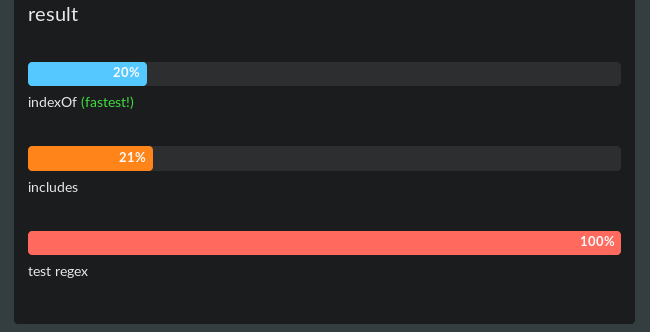
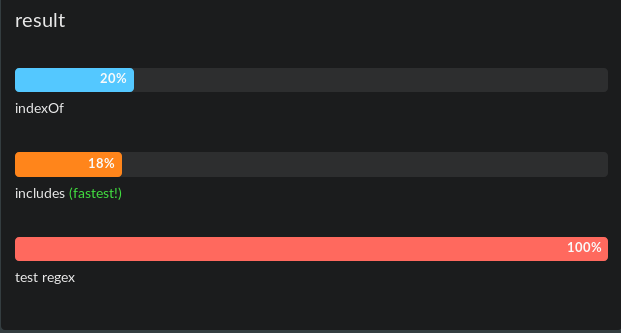
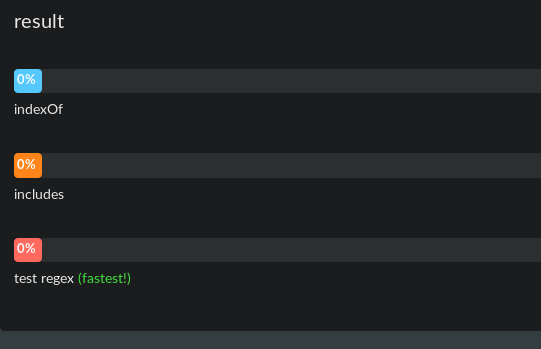

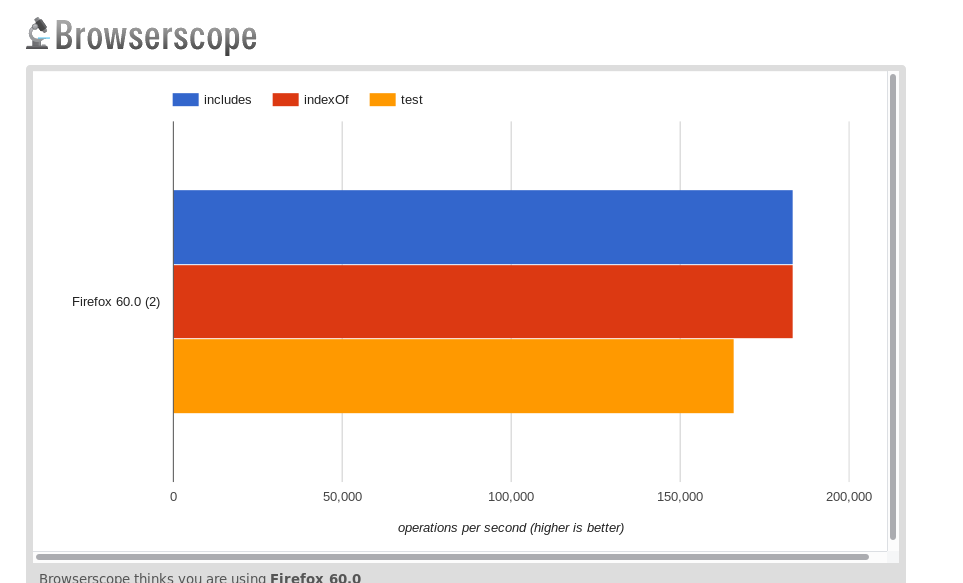
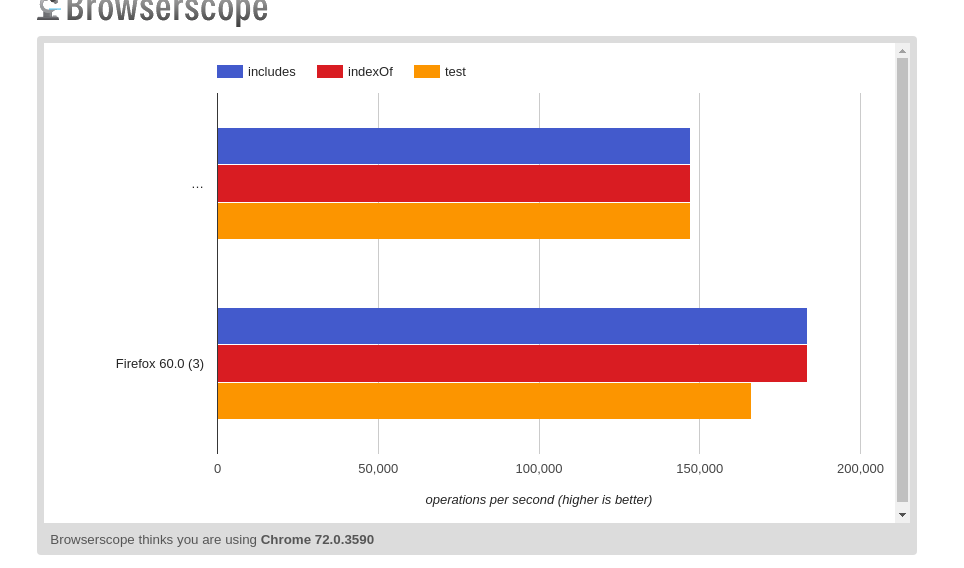

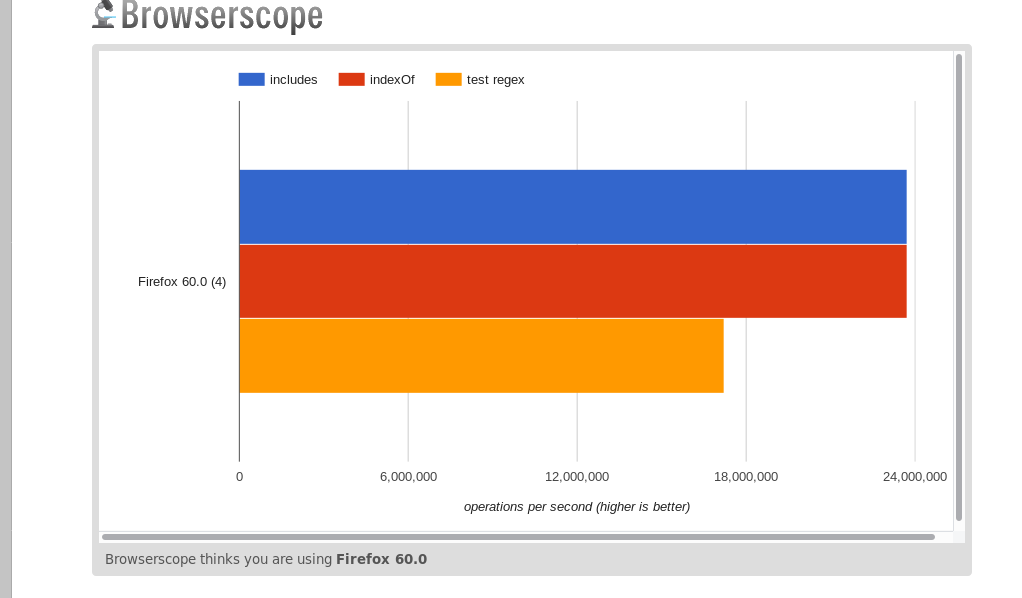
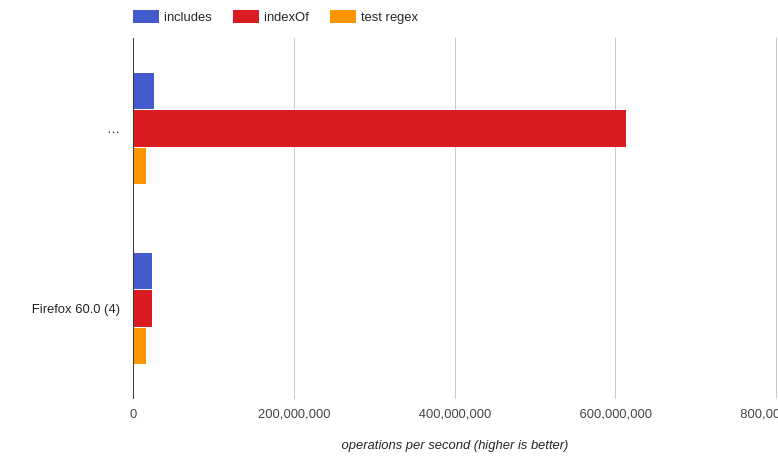
str.indexOf("xyz")should be compared with/xyz/.test(str)– ArakString.prototype.indexOfis more comparable toString.prototype.searchbecause both will return the start index of the match. The boolean expression'foo'.indexOf('bar') !== -1is better comparable to/bar/.test('foo')because both result in a bool value. That said, for simple expressions without groups and anchors the performance should be comparable.str.matchis wasting doing too much because it returns all the matches and I would advise against using it for comparisons.That said, if you don't have a performance problem chose the one that is more readable. – Igorot